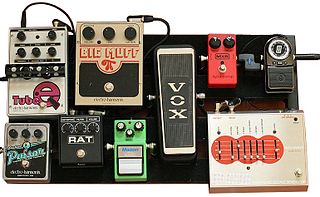
An effects unit, effects processor, or effects pedal is an electronic device that alters the sound of a musical instrument or other audio source through audio signal processing.

Vox is a British musical equipment manufacturer founded in 1957 by Thomas Walter Jennings in Dartford, Kent, England. The company is most famous for making the Vox AC30 guitar amplifier, used by The Beatles, The Rolling Stones, The Kinks, The Yardbirds, Queen, Dire Straits, U2, and Radiohead; the Vox Continental electric organ, the Vox wah-wah pedal used by Jimi Hendrix, and a series of innovative electric guitars and bass guitars. Since 1992, Vox has been owned by the Japanese electronics firm Korg.

A guitar amplifier is an electronic device or system that strengthens the electrical signal from a pickup on an electric guitar, bass guitar, or acoustic guitar so that it can produce sound through one or more loudspeakers, which are typically housed in a wooden cabinet. A guitar amplifier may be a standalone wood or metal cabinet that contains only the power amplifier circuits, requiring the use of a separate speaker cabinet–or it may be a "combo" amplifier, which contains both the amplifier and one or more speakers in a wooden cabinet. There is a wide range of sizes and power ratings for guitar amplifiers, from small, lightweight "practice amplifiers" with a single 6-inch speaker and a 10-watt amp to heavy combo amps with four 10-inch or four 12-inch speakers and a 100-watt amplifier, which are loud enough to use in a nightclub or bar performance.
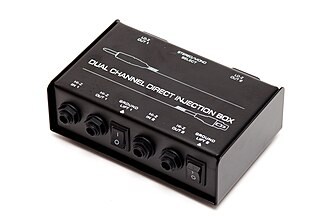
A DI unit is an electronic device typically used in recording studios and in sound reinforcement systems to connect a high output impedance unbalanced output signal to a low-impedance, microphone level, balanced input, usually via an XLR connector and XLR cable. DIs are frequently used to connect an electric guitar or electric bass to a mixing console's microphone input jack. The DI performs level matching, balancing, and either active buffering or passive impedance matching/impedance bridging. DI units are typically metal boxes with input and output jacks and, for more expensive units, “ground lift” and attenuator switches.
Boss is a manufacturer of effects pedals for electric guitar and bass guitar. It is a division of the Roland Corporation, a Japanese manufacturer that specializes in musical equipment and accessories. For many years Boss has manufactured a wide range of products related to effects processing for guitars, including "compact" and "twin" effects pedals, multi-effect pedals, electronic tuners and pedal boards. In more recent times, Boss expanded their product range by including digital studios, rhythm machines, samplers and other electronic music equipment. They also are now manufacturing solid-state amplifiers and speaker heads such as the Waza and the Katana. Both feature multi-effects units meant to emulate Boss' classic effects pedals.

Electro-Harmonix is a New York City-based company that makes electronic audio processors and sells rebranded vacuum tubes. The company was founded by Mike Matthews in 1968. It is best known for a series of guitar effects pedals introduced in the 1970s and 1990s. EHX also made a line of guitars in the 1970s.

Juan Alderete de la Peña is an American musician, best known as the longtime bassist of Racer X, the Mars Volta and Marilyn Manson.

The Ibanez Tube Screamer (TS808/TS9) is a guitar overdrive pedal, made by Ibanez. The pedal has a characteristic mid-boosted tone popular with blues, rock and metal players. The Tube Screamer has been used by many guitarists to create their signature sound, and is one of the most successful, widely copied, and custom-modified ("modded") overdrive pedals in the history of the electric guitar.

The DigiTechWhammy is a pitch shifter pedal manufactured by DigiTech. It was the first widely used effects pedal with foot-controlled pitch shifting effects. The pedal emulates sounds that a guitarist normally makes using the vibrato ("whammy") bar on the guitar, but with a greatly enhanced pitch range and without the tuning problems associated with traditional vibrato bars.

Brian Gibson is an American musician, artist, and video game developer based in Providence, Rhode Island. Gibson is best known as the bassist for the band Lightning Bolt. In the summer of 2015 he co-founded the game development company Drool. At Drool, he created the art and music for the video game Thumper and co-designed the game alongside Marc Flury. Thumper was released with critical acclaim in October 2016. He was previously a lead artist working at video game company Harmonix since 2001, but quit in the summer of 2015.

A bass amplifier is a musical instrument electronic device that uses electrical power to make lower-pitched instruments such as the bass guitar or double bass loud enough to be heard by the performers and audience. Bass amps typically consist of a preamplifier, tone controls, a power amplifier and one or more loudspeakers ("drivers") in a cabinet.
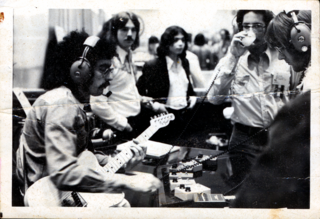
MXR is a New York–based manufacturer of effects pedals from Rochester. The company was co-founded in 1972 by Keith Barr and Terry Sherwood and incorporated as MXR Innovations, Inc. in 1974. The MXR trademark is now owned by Jim Dunlop.

Distortion and overdrive are forms of audio signal processing used to alter the sound of amplified electric musical instruments, usually by increasing their gain, producing a "fuzzy", "growling", or "gritty" tone. Distortion is most commonly used with the electric guitar, but may also be used with other electric instruments such as electric bass, electric piano, synthesizer and Hammond organ. Guitarists playing electric blues originally obtained an overdriven sound by turning up their vacuum tube-powered guitar amplifiers to high volumes, which caused the signal to distort. While overdriven tube amps are still used to obtain overdrive, especially in genres like blues and rockabilly, a number of other ways to produce distortion have been developed since the 1960s, such as distortion effect pedals. The growling tone of a distorted electric guitar is a key part of many genres, including blues and many rock music genres, notably hard rock, punk rock, hardcore punk, acid rock, and heavy metal music, while the use of distorted bass has been essential in a genre of hip hop music and alternative hip hop known as "SoundCloud rap".

The Fender Twin and Twin Reverb are guitar amplifiers made by Fender Musical Instruments Corporation. The Twin was introduced in 1952, two years before Fender began selling Stratocaster electric guitars. The amps are known for their characteristically clean tone.

The Mesa/Boogie Mark Series is a series of guitar amplifier made by Mesa Engineering. Originally just referred to as "Boogies", the product line took on the moniker "Mark Series" as newer revisions were put into production. The Mark Series amplifier was Mesa's flagship product until the introduction of the Rectifier series, and the amplifiers are collectable.
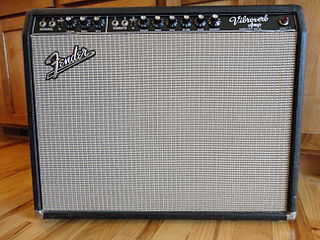
The Fender Vibroverb was a 40-watt combo guitar amplifier originally manufactured in 1963 and 1964. It was the first Fender amplifier to incorporate on-board reverb and tremolo/vibrato, which became a standard feature on many high-end Fender tube amps during the 1960s and 1970s.
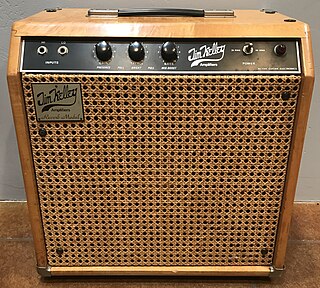
Jim Kelley Amplifiers is the trademark for the vacuum tube guitar amplifiers designed by Jim Kelley and manufactured by his company Active Guitar Electronics of Tustin, California between the years of 1978 and 1985. Approximately 600 of these amps were built during that time. The single-channel version of the amplifier employed modest gain in the preamp stages, Baxandall type bass and treble controls, a split load phase inverter, and four 6V6GT output tubes. The amplifiers produce 60 watts RMS at full power, and include a half power (30/60) switch.
BJFE Guitar Effects is a company which manufactures effects pedals for use with instruments such as an electric guitar. These pedals are commonly used by guitarists to modify the sound of their guitar before it reaches the amp. The company is located in Sweden, and was founded in 2000 by Björn Juhl. "BJFE" stands for Björn Juhl Förstärkarelektronik. Pedal types include distortion, overdrive, "vibe" (vibrato), compression, and equalization (EQ). Due to the limited production and handbuilt nature, these pedals are considered "boutique" guitar effects.

The Big Muff Pi (π), often known simply as the Big Muff, is a "fuzzbox" effects pedal produced in New York City by the Electro-Harmonix company, along with their Russian sister company Sovtek, primarily for use with the electric guitar. It is used by bassists as well due to the Big Muff's squeaky frequency response.
The Fender Pro was an instrument amplifier manufactured by Fender Electric Instruments from 1946 to 1965. It was characterized by its dual 6L6-family power tubes and single 15" speaker, with output power increasing from 18 watts up to 40 watts over its production run. The Pro was replaced in the Fender lineup by its offspring the Pro Reverb.


















